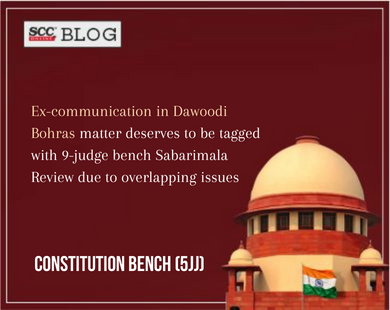Supreme Court: The 5-judge Constitution Bench of Sanjay Kishan Kaul, Sanjiv Khanna, Abhay S. Oka*, Vikram Nath and JK Maheshwari, JJ, has referred the issue relating to ex-communication of a person from the Dawoodi Bohra community to a larger bench and has observed that the same deserves to be tagged with the review petition of the Sabarimala Temple verdict that is pending for consideration before a 9-judge bench, after noticing similarity of issues in both the matters.
Case Trajectory
The Court was called upon to decide whether the view taken by a Constitution Bench in the case of Sardar Syedna Taher Saifuddin Saheb v. State of Bombay, (1962) Suppl. (2) SCR 496, requires reconsideration that had decided the validity of the Bombay Protection of Ex-communication Act, 1949.
In the said case, Sardar Syedna Taher Saifuddin Saheb, who was the 51st Dai-al-Mutlaq and the head of the Dawoodi Bohra community, challenged the Ex-communication Act on the ground that the same infringes the fundamental rights guaranteed under Articles 25 and 26 of the Constitution of India.
The Constitution Bench, by a majority, held that ex-communication amongst the Dawoodi Bohras forms an integral part of the management of the community. Hence, interference with the right to excommunicate amounts to interference with the right of the community to manage its own affairs in matters of religion. As the Ex-communication Act invalidates excommunication on any ground whatsoever including religious grounds, it was in clear violation of the right of the Dawoodi Bohra community guaranteed under Article 26 (b) of the Constitution of India.
In the case at hand, a writ petition was filed by the Central Board of Dawoodi Bohra Community for issuing a writ of mandamus directing the State Government to give effect to the provisions of the Ex-communication Act after reconsidering the decision of this Court in the case of Sardar Syedna case.
It is interesting to note that, meanwhile, the Maharashtra Protection of People from Social Boycott (Prevention, Prohibition and Redressal) Act, 2016 was also passed and by clause (c) of Section 20, the Ex-communication Act was repealed.
Maintainability of Writ Petition
The Court noted that the findings rendered by the majority view in the Sardar Syedna case are only in respect of the right of the head of the Dawoodi Bohra community to ex-communicate a member of the community. However, considering the definition of ‘community’ under Section 2(a) of the Excommunication Act, the applicability thereof was not confined only to the Dawoodi Bohra community.
As the provisions of the Excommunication Act were applicable to the practice of excommunication prevailing in different religions, castes or subcastes, while recording a finding regarding violation of Article26(b) only in relation to Dawoodi Bohra community, the entire Ex-communication Act could not have been declared void.
Therefore, the Court observed that even assuming that the view taken by the Constitution Bench is correct, the questions which certainly survives for consideration in the present day context are:
- whether the practice of ex-communication prevailing in other religions, castes or sub-castes is constitutionally valid.
- whether the power of the head of Dawoodi Bohra Community to ex-communicate its members is non-justiciable being protected under the umbrella of clause (b) of Article 26 of the Constitution.
Effect of ex-communication
The Court explained that a person who is ex-communicated by the community, will not be entitled to use the common property of the community and the burial/cremation grounds of the community. In a sense, such a person will virtually become untouchable (being banished or ostracized) within the community. In a given case, it will result in his civil death.
Further, even assuming that the ex-communication of members of the Dawoodi Bohra community is always made on religious grounds, the Court observed that the effect and consequences thereof, on the person excommunicated needs to be considered in the context of justiciable Constitutional rights.
“The ex-communication will have many civic consequences which will, prima facie, affect his fundamental right to live with dignity and the right to lead a meaningful life guaranteed by Article 21.”
Therefore, the Court said that it needs to be decided as to whether the right of the community to ex-communicate its members can be balanced with the other fundamental rights under Part III of the Constitution and in particular, Article 21
Overlapping Questions with those pending before a 9-judge bench in Sabarimala Temple Review case
The Court noticed that the following 2 out of the 7 questions framed by the 9-judge bench also need to be decided in the case hand:
“3. Whether the rights of a religious denomination under Article 26 of the Constitution of India are subject to other provisions of Part III of the Constitution of India apart from public order, morality and health?
4. What is the scope and extent of the word ‘morality’ under Articles 25 and 26 of the Constitution of India and whether it is meant to include Constitutional morality?”
Hence, as the exercise of balancing the rights under Article 26(b) with other rights under Part III and in particular Article 21 was not undertaken by the Constitution Bench in the Sardar Syedna case, the matter deserves to be tagged with Sabarimala Temple Review as the decision which will be rendered by the nine-Judge Bench in the said case will have a direct impact on the questions which arise for determination in this case.
[Central Board of Dawoodi Bohra Community v. State of Maharashtra, 2023 SCC OnLine SC 129, decided on 10.02.2023]
*Judgment authored by: Justice Abhay S. Oka
Appearances before the Court
For Petitioner: Senior Advocate Siddharth Bhatnagar
For Respondents: Senior Advocates Fali S. Nariman and Dariaus J. Khambata






